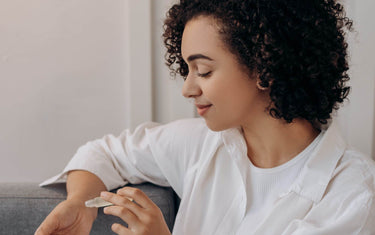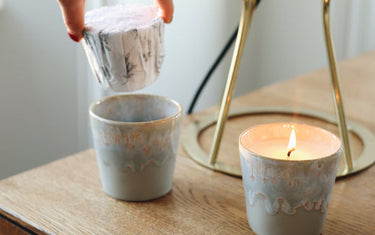5 min read / 17 June 2023 / Laura Garvin Gomez
How to Use Essential Oils on Your Skin
Learn the essential techniques and insider tips to effectively incorporate these oils into your skincare routine for optimal results.
Share this post

Essential oils are great for easing feelings of anxiety and stress and can also be a perfect addition to your daily skincare routine.
From working as an anti-ageing agent to increasing moisture levels, there are lots of ways your skin can benefit from their regular application.
Here we explain how to use essential oils on skin, and we answer a host of related questions that will hopefully give you the confidence to take your first step into the wonderful world of essential oils.
Can you put essential oils on your skin?It is perfectly safe to put essential oils on your skin, provided they have been diluted correctly, and the proper application guidelines followed. Essential oils are usually applied to the pressure points on the body, which are the chest, neck, wrists, inner elbows, temples and bottom of the feet. If it is your first time using an essential oil of any kind, it is recommended that you first complete a patch test to check for any potential allergic reaction. |
How to do a patch test for essential oils
Patch tests are a straightforward process that involves five simple steps. Use the guide below to test your suitability for an essential oil.
- Dilute the essential oil with a carrier oil of choice.
- Add a couple of drops of the mixture to a dry and clean area of your forearm.
- Place a plaster over the same area of skin.
- Leave in place for 24 hours.
- If you do not see any irritation, inflammation or reaction, then the oil should be safe to use.
Wash oil off your skin using warm, soapy water if you experience any of the symptoms mentioned above and do not use the oil on any other areas of your body.

Should you always dilute essential oils before applying to your skin?
Due to their high concentration levels, essential oils should always be diluted with a carrier oil, such as coconut oil, olive oil or jojoba oil.
Essential oils are derived from plants and trees, and their type, growth location and the season they were picked in can all affect its chemical concentration.
The general rule of topical application for essential oils is 2%, which should be safe to use for all skin types. This equates to two drops of essential oil for every teaspoon of carrier oil, or 5 drops for every 10ml of carrier oil.
For the elderly and children aged 15-12 years old, the recommended dilution level is 1%, as the skin for these age groups tends to be more sensitive and open to irritation.
Can you use any essential oils topically on skin?
Whilst you can use most essential oils on your skin without issues, some do have very high concentration levels that can cause irritation on your skin.
For example, if you apply citrus oils or bergamot essential oil and go out into the sun, you could experience some sensitivity. It is also recommended that you do not use pine or cinnamon oil on your face as they do not contain specific skincare benefits and are more suited for application elsewhere to stimulate circulation or to ease bodily pains.

How to use essential oils on skin
You can dilute essential oils and apply them to your skin in several ways:
- A common method is to apply directly by hand or by using a cotton ball or soft cloth to gently massage into the skin.
- People also dilute their essential oils and mix them with a moisturiser, combining the benefits of both applications.
- Other ways you can absorb essential oils into the skin are through a body massage, allowing the oils to be rubbed into the skin.
- Or in a bath, where the oils can be naturally soaked in.
Do you have to wash essential oils off your skin?
Once you have applied essential oils to your skin, you may wonder if you should wash any residue away after a certain period of time.
Whether you wash essential oils off your skin is entirely up to you. Some people prefer to wait 30-45 minutes to let the oil absorb before washing the skin to avoid potential skin irritation, whilst others believe that using a carrier oil is enough.
Because certain essential oils are more concentrated than others this can increase the risk of irritation. Oregano oil is one such example, so you may prefer to wash it off after absorption.
If you are using essential oils on your face you may want to wash them off too. And if you have sensitive skin, then washing the oil off could be a good idea to reduce the risk of irritating the skin.

What are some tips on how to use essential oils on your skin?
We’ve put together some other helpful tips to bear in mind when using essential oils on your skin or anywhere else:
- Only buy essential oils from a reputable and trusted seller. Essential oils should be 100% pure and not contain any additional ingredients. They should also come with the correct documentation about how they have been sourced, tested and how they can be used.
- Do not rub essential oils on your mouth, eyes, nose or private parts, even after they have been diluted. This will likely cause a lot of irritation and could lead to further complications.
- Throw away any essential oils that are more than 2-3 years old. This is especially true of opened oils, as continued exposure to oxygen will likely cause them to be spoiled. Using oils that are too old could irritate your skin, cause an allergic reaction, or cause skin burns.
- Allergic reactions can cause hives, rashes or in more extreme cases, breathing problems. If you are currently taking any prescribed medications or are unsure about using them, speak with your doctor first.
- Lastly, do not ingest an essential oil unless it is clearly stated as being ‘food grade’ (Nikura do not sell food grade essential oils). Do not use essential oils on damaged skin, and store them in cool, dry areas of your home away from direct and indirect heat sources.

Applying essential oils to your skin should not pose any concerns, provided you take the necessary precautions. This includes carrying out a patch test (for first-time users), diluting the essential oil with a carrier oil and avoiding sensitive areas of your body. You can use essential oils to improve the condition of your skin, whilst enjoying a whole host of mental and physical health benefits that can enhance your day-to-day life.










